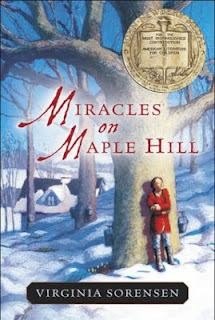Miracles on M
 aple Hill takes place in the Pennsylvania countryside after World War II. Marly's father has returned from war, irrevocably altered, and it is her family's hope that the fresh air and wide open spaces will return him to his former self. Away from the rush of the cities and the dark memories of death, Marly's father begins to heal. Like the sap that signals the beginning of spring, he becomes alive again and active in the world. His children bring him back into the world though a succession of small miracles. Joe, Marly's brother, shows his father that humanity and human kindness still exists when he saves the local hermit from freezing to death and invites him home for Christmas. It is this act that opens their father up and he shares part of his experience in the prison camp, knowing "Joe would have been one of the good ones," (180) one of the men who helped others. Marly and Joe's father finally shows how much he has grown when he takes charge of their neighbor, Mr. Chris's sap crop when Mr. Chris suffers a heart attack. Together with his entire family and local students, they save the crop and the Chris's livilihood. This selfless act shows that human decency is still alive and blooming.
aple Hill takes place in the Pennsylvania countryside after World War II. Marly's father has returned from war, irrevocably altered, and it is her family's hope that the fresh air and wide open spaces will return him to his former self. Away from the rush of the cities and the dark memories of death, Marly's father begins to heal. Like the sap that signals the beginning of spring, he becomes alive again and active in the world. His children bring him back into the world though a succession of small miracles. Joe, Marly's brother, shows his father that humanity and human kindness still exists when he saves the local hermit from freezing to death and invites him home for Christmas. It is this act that opens their father up and he shares part of his experience in the prison camp, knowing "Joe would have been one of the good ones," (180) one of the men who helped others. Marly and Joe's father finally shows how much he has grown when he takes charge of their neighbor, Mr. Chris's sap crop when Mr. Chris suffers a heart attack. Together with his entire family and local students, they save the crop and the Chris's livilihood. This selfless act shows that human decency is still alive and blooming.

No comments:
Post a Comment
Note: Only a member of this blog may post a comment.